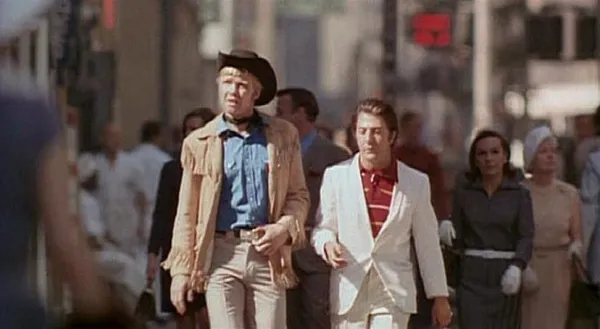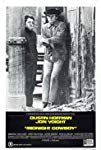Eye For Film >> Movies >> Midnight Cowboy (1969) Film Review
Midnight Cowboy
Reviewed by: Jennie Kermode

Like many of those films now regarded as classics, Midnight Cowboy is founded on a simple premise, elements of which - a country boy lost in the big city, a close friendship forming between two very different men - had been explored many times before. What makes it stand out is the telling, together with the fact that it ventured into territory rarely acknowledged in US mainstream cinema at a time when major cultural changes were underway. There's no disputing the fact that it plays differently today. Middle class America is no longer shocked by depictions of urban poverty or outsider life, though it's still vanishingly rare to see sex workers as heroes. Other issues, however, have come to the fore, with modern audiences much more likely to be shocked by depictions of the historical treatment of gay characters.
Gay people aren't really on the radar for young Joe Buck (Jon Voight) as he travels from rural Texas to the Big Apple planning to get rich by selling his sexual services, though most viewers today will see instantly that his cowboy image has iconic gay fetish appeal. Joe had a girl back there in the sticks and for a while at least he made her happy, so he figures that there must be lots of lonely women in the city he could please. Good natured and unwilling to be cruel, however, he's all too easy to hustle himself, and things are looking glum until her meets small time con man 'Ratso' Rizzo (played by Dustin Hoffman and the inspiration for a certain Muppet). Though surviving in the city proves to be tough and their dreams seem far out of reach, this friendship sustains them both.
There are still very few films that make room for male characters to be emotionally honest to this degree - there were even fewer in 1969. Voight was so excited by the opportunity that he agreed to work for minimum wage and the result stands as one of his finest performances. There's no conventional love interest here, the emotional focus of the film being entirely on the relationship between the two friends, which stands in contrast to the lack of emotional intimacy in the sex scenes and to the weight of loneliness that Joe discovers in the city, where the promise of opportunity seems to fail a lot of people completely. He finds himself increasingly sympathetic towards outcasts of all kinds, and the film was important in its time for highlighting the distress and loneliness caused by homophobia - but when Rizzo's health deteriorates and their situation becomes increasingly desperate, sympathy is a luxury Joe can't afford.
John Schlesinger's confident direction brings out a side of New York City that had been largely ignored by cinema since the films noirs of the Forties. it's a vivid portrait whose frequent grimness is balanced by Hugh A Robertson's brilliant editing, with montages that convey all the noise and giddiness of the urban experience for a newcomer who never fully finds his feet. Despite this, the film retains its sense of intimacy, never overwhelmed by its cultural references, so that it feels very personal, a very human take on a particular place and time, and that's where the magic happens.
Reviewed on: 14 Sep 2019


















